The day before Christmas Eve when Ryan Tubridy read a text out on his show saying there were big queues outside a butcher in Terenure in Dublin, I smiled knowing it must be the Brown Pig. The queues had been there for months, it was just that morning they were at Christmas levels.
Even though the Brown Pig has only been in the village since 2017, it looks and feels like a traditional butcher. A small shop, ribs of beef proudly age in the window while inside, the glass.
“Here’s what you do with this bit of oxtail.”
“A bit of pancetta will really lift that lasagne.”
“How was that roast pork last weekend? Did the crackling work out for you?” 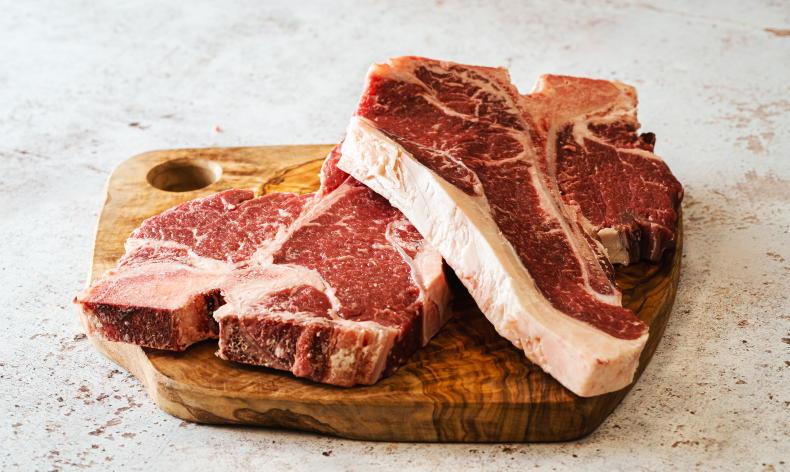
The relatively new butcher shop has harnessed that old sense of community and throughout the pandemic the queues grew and grew.
Of course, it wasn’t just the chats that attracted customers, it’s the quality of the meat. Owner James Kenny says: “I learned my trade working in great butchers such as James Whelan, Lawlor’s and Gleeson’s and knew the importance of excellent quality producers. So from the beginning, I worked with great farmers.
“Paddy Hegarty in Wicklow supplies our lamb and beef, straight from his farm to the slaughter house in Clonmore, Carlow, to us. Crowe’s Farm in Tipperary supply our turkeys and bacon and Margaret McDonald in the Curragh has some of the best chicken in Ireland, I’d say. While I was learning my trade, I also saw the appetite grow for the added value products, the meat trays. So our concept is simple, we add three ingredients to our meat. Our Spanish chicken for example, is two free range chicken breasts, a Spanish sauce, chorizo and manchego. Customers just put it in the oven and they have a delicious dinner.”
By last March, the Brown Pig had established itself and was doing fine but the pandemic brought things to a whole new level. “At the start it was madness,” says James. “People were scared and panic buying. And we were worried because we didn’t know if the business would be allowed stay open. 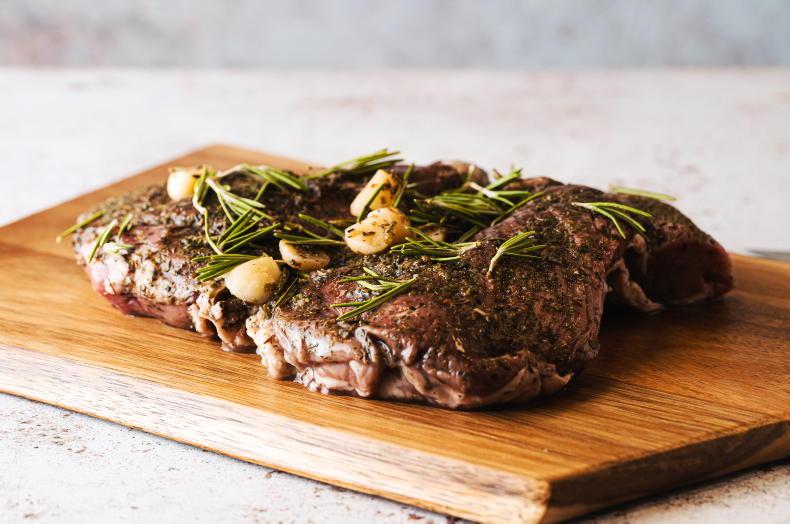
That Thursday when the schools closed, we were wiped out. We didn’t have enough stock or staff but once we got over those first few weeks, our business went onto another level, it was like a machine after that.
“Because people couldn’t eat out, they had more time at home to be creative in the kitchen so we saw increased interest in the likes of oxtail, short ribs or bavettes slow cooked on the barbecue, about 100% increase in them since the start of the pandemic. But we also saw a big uptake in our trays for the nights when people didn’t want to cook, a substitute for going to a restaurant.”
This inspired James to get more creative himself. “When the shop closed and the lads went home, I would stay on developing more dishes. People say when they are creating something their hands are just doing it, they don’t know where its coming from, that’s what happens with me. We butcher the lamb carcasses and I used the trimmings to create our lamb koftas, blending spices to create a Greek feel to them. We added loads to our range – fillet steak Diane, beef Wellington, pork meatballs with nduja sausage, salt and chilli brisket, walnut and plum chicken. It was a form of chilling out after a busy day.”
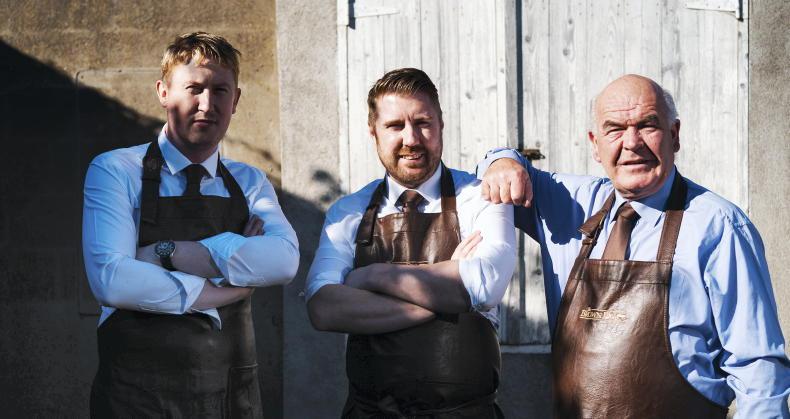
Stephen Kenny, James Kenny and Pat Caulfield of the Brown Pig Terenure.
And the days were certainly busy, in fact that is one of their challenges. “We’re a small shop so in Level 5, we can only allow two customers in. That’s when the queues started, and that is stressful. I’m always conscious of the queue, of people standing in the cold. Yet, we don’t want to rush our customers. Meat is personable and I have a strong team-Pat and my brother Stephen are great characters and give excellent advice and attention.”
Ironically, it was the queues that generated more queues. “People started saying, ‘What is everyone queuing for?’ I remember one woman coming in saying, ‘I saw the queue and just joined it to see what’s going on’. She bought six products that day and now comes in every week. Last Easter, the queue stretched 1km long, it was bananas,” James says laughing.
“We’ve just opened a concession in Barnhill Stores in Dalkey and it’s great, the business is doing well. What’s really important though is that people are appreciating and supporting their local butcher shop and it’s heartening to hear that many other butchers in Ireland are saying the same.”

When the world went quiet, that’s when Mags Riordan got busy. “People were in their mad rushed life. Everybody was busy. The pandemic made people stop, appreciate nature, listen to the birds and the bees in their garden. I saw it as clear as day in my orders.”
Bumblebee Flower Farm in Drimoleague, west Cork, is Ireland’s first dedicated edible flower farm and her cut flowers are available 52 weeks of the year. They are all grown on her two acres where she is completely driven by the environment, biodiversity and our pollinators, the wild bees.
Before the pandemic, Mags says business was challenging. 
“There was a lot of competition – companies claiming to be doing what I was doing, but they weren’t. When the pandemic hit, however, and imports had to stop, I was one of the few growers that actually had fresh flowers available and the only one that was doing it organically.”
“Demand came from two types of customers; those who wanted fresh, beautiful flowers that I was able to supply, but there was also the customer that now had the time to question where their flowers were coming from and what kind of impact that was having on our environment and our pollinators. They were asking intelligent questions and being more thoughtful about their purchases. They were challenging assumptions and buzzwords like sustainable and authentic and figuring out for themselves what actually is sustainable and authentic.”
And that’s the thing; Mags is fostering the natural flowers of Ireland, that grow best in our soil and environment. “At the moment, we have beautiful blue-purple hyacinths, peony tulips and helleboars as well as skimmia and heather, both flowering foliage. And the irises are on the way, their colour will range from dark purple to pale blues and yellows and they are all great pollinators for our wild bees. We’re also developing our Regenerative Bouquet, which is made up of herbs, roses and scented seasonal flowers and it helps to nurture and nourish the emotional and physical self with its scent and beauty.”
Not only are Mags’s flowers absolutely stunning, but the scent naturally fills a room. “My design is loose and unstructured so when you open the box, the scent hits you. It looks like you grabbed them from the garden, although it takes a lot of work and structure to achieve that unstructured look,” she laughs.
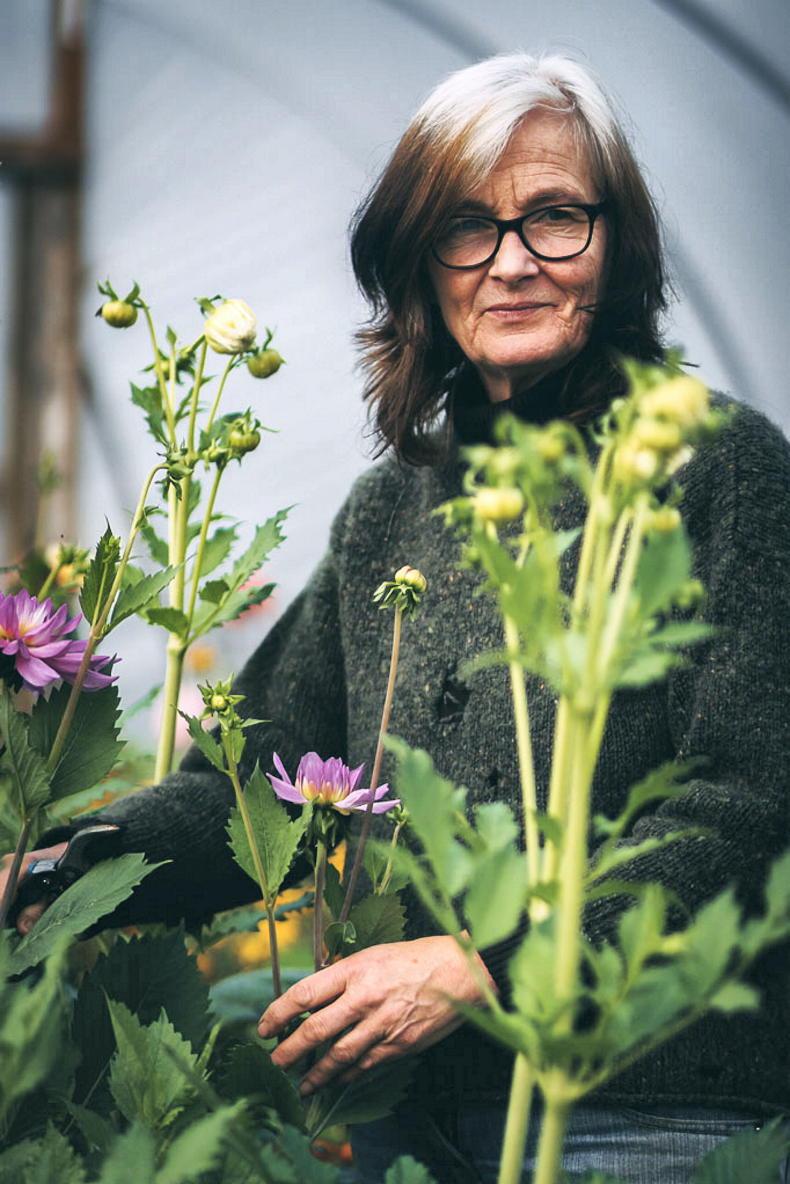
As well as their beauty and scent, Mags says her flowers give people an emotional connection. “I have been in tears from some of the thank you notes. People feel so far away from their loved ones and my flowers are a way of reaching out and connecting. They also evoke memories. 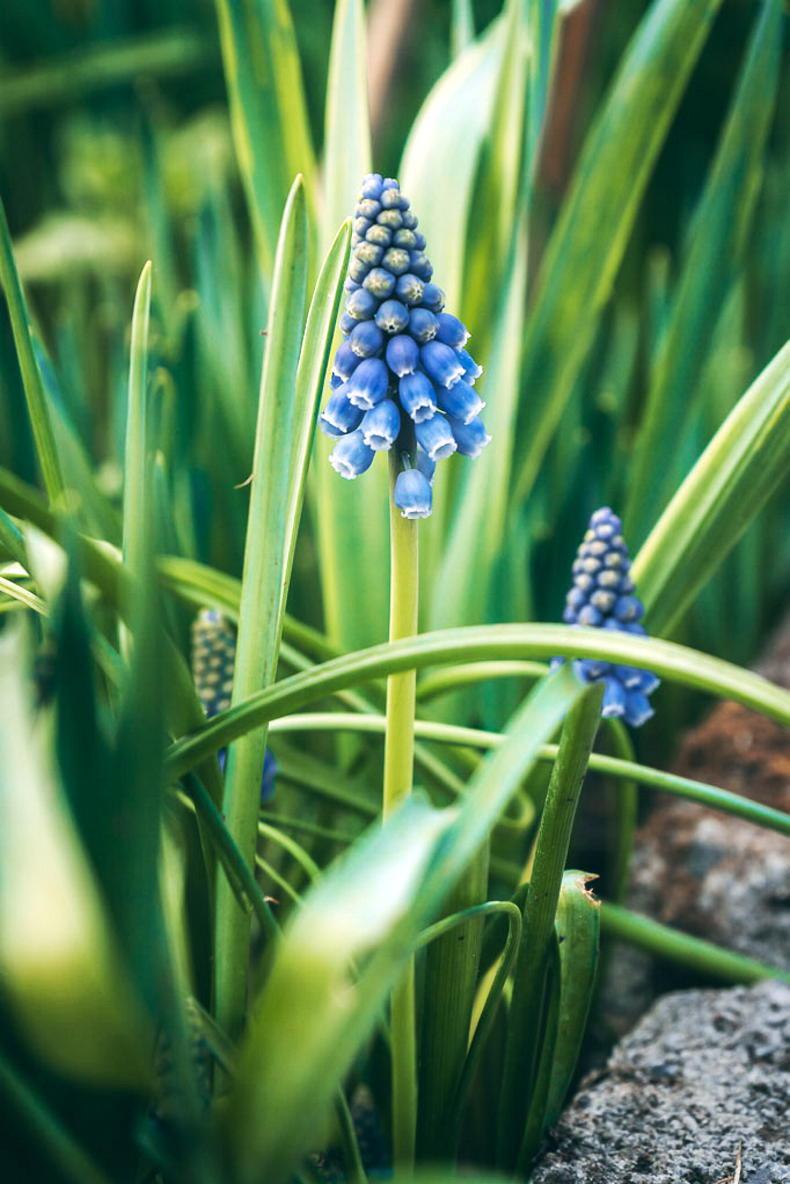
I remember a girl said, ‘I opened the box and the smell immediately brought back memories of being in my granny’s garden’.”
While orders grew steadily during the first lockdown, the real test was when the florists reopened. “Oh the relief,” says Mags. “The pandemic has given people time to really appreciate what I’m doing and the ecological impact and as a result, I built a loyal customer base. Before all this, my orders were minimal and I used have that panic of, will an order come in to cover that bill? Now the challenge is meeting the demand. We were sold out a week before Valentine’s Day. I have taken on two staff members and will be taking on two more this year.
“It brings me real joy that people are appreciating our heritage flowers but not just that, their support is helping to nurture, nourish and protect life through our regenerative growing practices.”

Michael Keenan and Max Fox of theFlying Elephant.
Not only did our lives change last March, but our homes did too. Young professionals moved home and set up shop in their old bedrooms. Spare rooms became offices for parents hiding from home schooling. There was a scramble for desks and chairs as we zoomed our way into a pandemic. And one Irish company met this demand…by pure accident.
Michael Keelan, director of Flying Elephant says: “We are an event production company so we do everything from small stadium branding to large festivals. Café and restaurant fit outs, building pop up shops, that’s our gig. Our whole business is around the gathering of people. We started small and grew, and at the start of 2020, we had a busy year ahead. Then in 48 hours, over 60 jobs cancelled.”
Of course, we were worried but we solve problems for a living, it’s all fighting fires and Last Minute Larry when you work in events. We went into problem solving mode.
“A friend had just started working from home and needed a desk. We had a load of plywood out the back from a cancelled job so we cut him a desk, a really simple design that he could just click together like a jigsaw. He was delighted so we started thinking, maybe there is something in this and put a picture up on Instagram and it just took off.
“In those first few weeks of the pandemic, we were delivering more than 150 desks a day.”
Michael says there were a few factors at play.
“No one knew how long this working from home set up was going to last so they didn’t want to spend a fortune on a desk that took over the room. Others were keen to support local and loved the natural look of the product.
“But it was the simplicity and convenience that probably won most people over. It can be assembled and dissembled in minutes so people that were using their bedroom as an office could flat pack it and put it under the bed or behind the couch and their office just disappears. It was definitely a case of right time, right place, right product.”
Given its success, the company then started to diversify into accessories-standing desks, laptop trays, monitor stands and footrests.
“A lot of it was developed from consumer feedback but we also were sharing ideas with a similar company in Australia called IsoKing. It was great because it’s not like we were in competition. Their customers are on the other side of the world but we were all living in lockdown.
“Now we have expanded the range into furniture like wine racks, drawing boards, bike storage, garden furniture, we even made a garden bar.”
Michael says they also doing different business with clients.
“We diversified into COVID screens at checkouts, hand sanitiser dispensers, handwash stations. If you’ve sanitised your hands in any of the big supermarkets, it’s likely that we are behind it.”
However, Michael says despite adapting and thriving during a pandemic, he is looking forward to the day when they get back to a new normal.
“The items are niche and attached to a certain moment in time but I hope we will eventually go back to our original work. Bring on the big festivals and the last minute panics,” he laughs.
“I’m also looking forward to going beyond our 5km and getting back up to Cavan to my late grandfather’s beef farm. In another life, I would love to have been a farmer.”
The day before Christmas Eve when Ryan Tubridy read a text out on his show saying there were big queues outside a butcher in Terenure in Dublin, I smiled knowing it must be the Brown Pig. The queues had been there for months, it was just that morning they were at Christmas levels.
Even though the Brown Pig has only been in the village since 2017, it looks and feels like a traditional butcher. A small shop, ribs of beef proudly age in the window while inside, the glass.
“Here’s what you do with this bit of oxtail.”
“A bit of pancetta will really lift that lasagne.”
“How was that roast pork last weekend? Did the crackling work out for you?” 
The relatively new butcher shop has harnessed that old sense of community and throughout the pandemic the queues grew and grew.
Of course, it wasn’t just the chats that attracted customers, it’s the quality of the meat. Owner James Kenny says: “I learned my trade working in great butchers such as James Whelan, Lawlor’s and Gleeson’s and knew the importance of excellent quality producers. So from the beginning, I worked with great farmers.
“Paddy Hegarty in Wicklow supplies our lamb and beef, straight from his farm to the slaughter house in Clonmore, Carlow, to us. Crowe’s Farm in Tipperary supply our turkeys and bacon and Margaret McDonald in the Curragh has some of the best chicken in Ireland, I’d say. While I was learning my trade, I also saw the appetite grow for the added value products, the meat trays. So our concept is simple, we add three ingredients to our meat. Our Spanish chicken for example, is two free range chicken breasts, a Spanish sauce, chorizo and manchego. Customers just put it in the oven and they have a delicious dinner.”
By last March, the Brown Pig had established itself and was doing fine but the pandemic brought things to a whole new level. “At the start it was madness,” says James. “People were scared and panic buying. And we were worried because we didn’t know if the business would be allowed stay open. 
That Thursday when the schools closed, we were wiped out. We didn’t have enough stock or staff but once we got over those first few weeks, our business went onto another level, it was like a machine after that.
“Because people couldn’t eat out, they had more time at home to be creative in the kitchen so we saw increased interest in the likes of oxtail, short ribs or bavettes slow cooked on the barbecue, about 100% increase in them since the start of the pandemic. But we also saw a big uptake in our trays for the nights when people didn’t want to cook, a substitute for going to a restaurant.”
This inspired James to get more creative himself. “When the shop closed and the lads went home, I would stay on developing more dishes. People say when they are creating something their hands are just doing it, they don’t know where its coming from, that’s what happens with me. We butcher the lamb carcasses and I used the trimmings to create our lamb koftas, blending spices to create a Greek feel to them. We added loads to our range – fillet steak Diane, beef Wellington, pork meatballs with nduja sausage, salt and chilli brisket, walnut and plum chicken. It was a form of chilling out after a busy day.”

Stephen Kenny, James Kenny and Pat Caulfield of the Brown Pig Terenure.
And the days were certainly busy, in fact that is one of their challenges. “We’re a small shop so in Level 5, we can only allow two customers in. That’s when the queues started, and that is stressful. I’m always conscious of the queue, of people standing in the cold. Yet, we don’t want to rush our customers. Meat is personable and I have a strong team-Pat and my brother Stephen are great characters and give excellent advice and attention.”
Ironically, it was the queues that generated more queues. “People started saying, ‘What is everyone queuing for?’ I remember one woman coming in saying, ‘I saw the queue and just joined it to see what’s going on’. She bought six products that day and now comes in every week. Last Easter, the queue stretched 1km long, it was bananas,” James says laughing.
“We’ve just opened a concession in Barnhill Stores in Dalkey and it’s great, the business is doing well. What’s really important though is that people are appreciating and supporting their local butcher shop and it’s heartening to hear that many other butchers in Ireland are saying the same.”

When the world went quiet, that’s when Mags Riordan got busy. “People were in their mad rushed life. Everybody was busy. The pandemic made people stop, appreciate nature, listen to the birds and the bees in their garden. I saw it as clear as day in my orders.”
Bumblebee Flower Farm in Drimoleague, west Cork, is Ireland’s first dedicated edible flower farm and her cut flowers are available 52 weeks of the year. They are all grown on her two acres where she is completely driven by the environment, biodiversity and our pollinators, the wild bees.
Before the pandemic, Mags says business was challenging. 
“There was a lot of competition – companies claiming to be doing what I was doing, but they weren’t. When the pandemic hit, however, and imports had to stop, I was one of the few growers that actually had fresh flowers available and the only one that was doing it organically.”
“Demand came from two types of customers; those who wanted fresh, beautiful flowers that I was able to supply, but there was also the customer that now had the time to question where their flowers were coming from and what kind of impact that was having on our environment and our pollinators. They were asking intelligent questions and being more thoughtful about their purchases. They were challenging assumptions and buzzwords like sustainable and authentic and figuring out for themselves what actually is sustainable and authentic.”
And that’s the thing; Mags is fostering the natural flowers of Ireland, that grow best in our soil and environment. “At the moment, we have beautiful blue-purple hyacinths, peony tulips and helleboars as well as skimmia and heather, both flowering foliage. And the irises are on the way, their colour will range from dark purple to pale blues and yellows and they are all great pollinators for our wild bees. We’re also developing our Regenerative Bouquet, which is made up of herbs, roses and scented seasonal flowers and it helps to nurture and nourish the emotional and physical self with its scent and beauty.”
Not only are Mags’s flowers absolutely stunning, but the scent naturally fills a room. “My design is loose and unstructured so when you open the box, the scent hits you. It looks like you grabbed them from the garden, although it takes a lot of work and structure to achieve that unstructured look,” she laughs.

As well as their beauty and scent, Mags says her flowers give people an emotional connection. “I have been in tears from some of the thank you notes. People feel so far away from their loved ones and my flowers are a way of reaching out and connecting. They also evoke memories. 
I remember a girl said, ‘I opened the box and the smell immediately brought back memories of being in my granny’s garden’.”
While orders grew steadily during the first lockdown, the real test was when the florists reopened. “Oh the relief,” says Mags. “The pandemic has given people time to really appreciate what I’m doing and the ecological impact and as a result, I built a loyal customer base. Before all this, my orders were minimal and I used have that panic of, will an order come in to cover that bill? Now the challenge is meeting the demand. We were sold out a week before Valentine’s Day. I have taken on two staff members and will be taking on two more this year.
“It brings me real joy that people are appreciating our heritage flowers but not just that, their support is helping to nurture, nourish and protect life through our regenerative growing practices.”

Michael Keenan and Max Fox of theFlying Elephant.
Not only did our lives change last March, but our homes did too. Young professionals moved home and set up shop in their old bedrooms. Spare rooms became offices for parents hiding from home schooling. There was a scramble for desks and chairs as we zoomed our way into a pandemic. And one Irish company met this demand…by pure accident.
Michael Keelan, director of Flying Elephant says: “We are an event production company so we do everything from small stadium branding to large festivals. Café and restaurant fit outs, building pop up shops, that’s our gig. Our whole business is around the gathering of people. We started small and grew, and at the start of 2020, we had a busy year ahead. Then in 48 hours, over 60 jobs cancelled.”
Of course, we were worried but we solve problems for a living, it’s all fighting fires and Last Minute Larry when you work in events. We went into problem solving mode.
“A friend had just started working from home and needed a desk. We had a load of plywood out the back from a cancelled job so we cut him a desk, a really simple design that he could just click together like a jigsaw. He was delighted so we started thinking, maybe there is something in this and put a picture up on Instagram and it just took off.
“In those first few weeks of the pandemic, we were delivering more than 150 desks a day.”
Michael says there were a few factors at play.
“No one knew how long this working from home set up was going to last so they didn’t want to spend a fortune on a desk that took over the room. Others were keen to support local and loved the natural look of the product.
“But it was the simplicity and convenience that probably won most people over. It can be assembled and dissembled in minutes so people that were using their bedroom as an office could flat pack it and put it under the bed or behind the couch and their office just disappears. It was definitely a case of right time, right place, right product.”
Given its success, the company then started to diversify into accessories-standing desks, laptop trays, monitor stands and footrests.
“A lot of it was developed from consumer feedback but we also were sharing ideas with a similar company in Australia called IsoKing. It was great because it’s not like we were in competition. Their customers are on the other side of the world but we were all living in lockdown.
“Now we have expanded the range into furniture like wine racks, drawing boards, bike storage, garden furniture, we even made a garden bar.”
Michael says they also doing different business with clients.
“We diversified into COVID screens at checkouts, hand sanitiser dispensers, handwash stations. If you’ve sanitised your hands in any of the big supermarkets, it’s likely that we are behind it.”
However, Michael says despite adapting and thriving during a pandemic, he is looking forward to the day when they get back to a new normal.
“The items are niche and attached to a certain moment in time but I hope we will eventually go back to our original work. Bring on the big festivals and the last minute panics,” he laughs.
“I’m also looking forward to going beyond our 5km and getting back up to Cavan to my late grandfather’s beef farm. In another life, I would love to have been a farmer.”









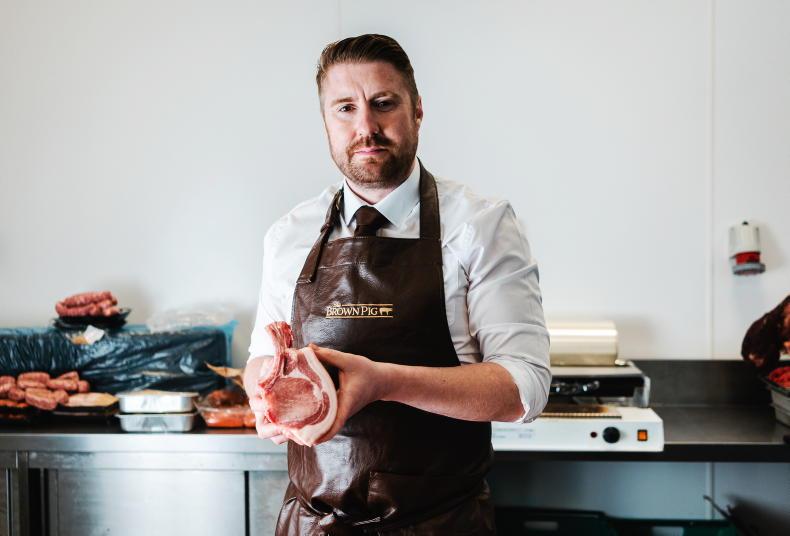




 This is a subscriber-only article
This is a subscriber-only article










SHARING OPTIONS: